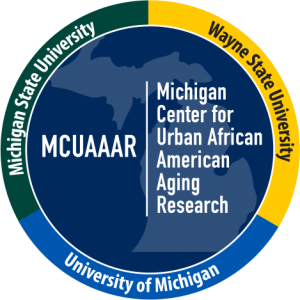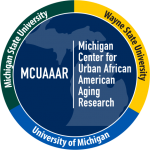
Michigan Center for Urban African American Aging Research
Junior Faculty Research Mentoring and Funding Opportunity FY2021-2022
The Michigan Center for Urban African American Aging Research (MCUAAAR) is one of 18 Resource Centers for Minority Aging Research (RCMAR) funded by the National Institute on Aging. MCUAAAR is a collaborative effort between the University of Michigan, Program for Research on Black Americans, the Wayne State University, Institute of Gerontology, and the Michigan State University, College of Human Medicine and School of Social Work. The Michigan Retirement and Disability Research Center (MRDRC) is one of four research centers within the U.S. Social Security Administration’s (SSA) Retirement and Disability Research Consortium.
MCUAAAR’s Purpose
One of MCUAAAR’s major goals is to identify and mentor junior investigators who are committed to research careers related to the science and amelioration of health inequities and disparities among older African Americans. MCUAAAR junior investigators come from all academic departments and professional schools including but not limited to Social Work, Public Health, Nursing, Medicine, Psychology, Public Policy, Economics and Sociology. MCUAAAR provides junior faculty investigators the opportunity to join a robust community of scholars and faculty dedicated to nurturing the next generation of successful researchers addressing racial and ethnic influences on aging-related social and behavioral science.
MRDRC’s Purpose
The MRDRC promotes high quality research on retirement, disability, and Social Security policy; communicates findings to the policy community and the public; enhances access to relevant research data; and helps to train new scholars. MRDRC serves the public and policy community as an in depth source of information on a range of issues related to retirement income security.
Call for Proposals from MCUAAAR and MRDRC in Partnership
This is a special call for retirement or disability research proposals that focus on the well-being of older African-Americans and/or disparities among different race/ethnic groups. To receive funding, individuals must have demonstrated interest in retirement and disability topics that relate to the Social Security Administration’s research agenda. In partnership, MCUAAAR and MRDRC seek proposals that support junior investigator-initiated research pilot projects that can lead to independent SSA- or NIH-funded projects. Collaborative research projects that involve faculty from more than one department, school or institute are also encouraged.
Topics of interest include, but are not limited to
- trends in disability;
- work in the modern economy;
- age of retirement and its determinants;
- racial differences in wealth;
- reasons for leaving the labor market;
- subjective retirement;
- planning and preparation for retirement;
- financial literacy;
- pensions, accumulation of home equity, and other saving for retirement;
- living arrangements in retirement;
- intergenerational transfers of time and material support within family lines;
- the importance of Social Security and other government benefits during retirement.
MCUAAAR Faculty Mentoring Process
Pilot research studies conducted by junior faculty are funded as a vehicle for MCUAAAR’s mentoring process, which provides a firm foundation upon which the scientists can build successful academic research careers. Faculty from a variety of disciplines from the University of Michigan, Michigan State University, and Wayne State University are involved.
Eligibility
Junior faculty and research scientists/investigators are eligible to apply for this award. The mentoring program is for early-stage researchers who hold an academic rank, or appointment equivalent to, assistant professor. All MCUAAAR scientists have a minimum of two formal mentors, one whom the scientist lists in their proposal and another who is a MCUAAAR faculty member (this mentor will be assigned during the first month of the pilot study).
The financial awards, for the one-year period of 10/1/2021 to 9/30/2022, are available through the MRDRC via a cooperative agreement with the SSA. Individual requests may not exceed $25,000 in direct costs. Funds cannot be used to support senior faculty salaries or to purchase equipment. Studies involving human subjects must be approved by institutional review board prior to release of funds. MCUAAAR’s mentoring covers 10/01/2021 to 09/30/2023.
Each proposal must contain the following information:
- The name and contact information of each investigator.
- NIH Biographical Sketch of each investigator.
- Description of Proposed Research (not to exceed 4 single spaced pages, excluding references). This should include the following sections: Specific Aims, Research Strategy, Significance, Innovation, Approach and References.
- Budget. (PDF using MCUAAAR budget template).
- Budget justification (one page).
- Other current grant support.
- NIH biographical sketch of the investigator’s mentor(s).
Only applications in Arial 11-point font or larger will be accepted. All application materials should be in PDF and submitted using the Qualtrics online submission tool available here: Mentoring Funding Application.
The completed application must be received by Tuesday, September 7, 2021, 8 p.m. (EDT).
Questions regarding this opportunity should be submitted to Cheri Brooks at the Michigan Retirement and Disability Research Center, [email protected].
For more details: https://bit.ly/mentoringFunding

